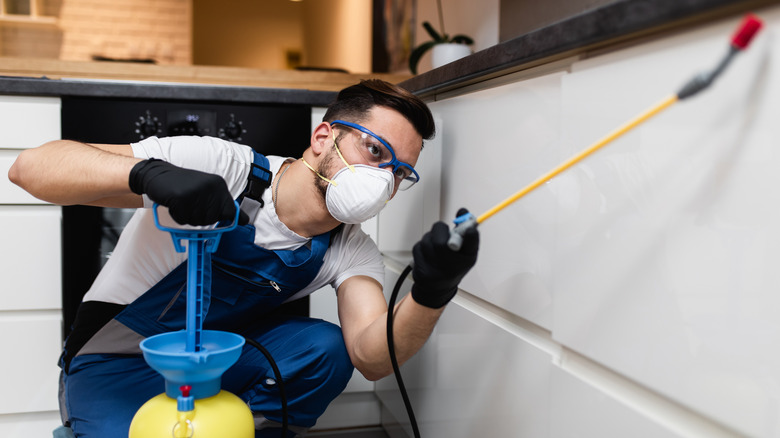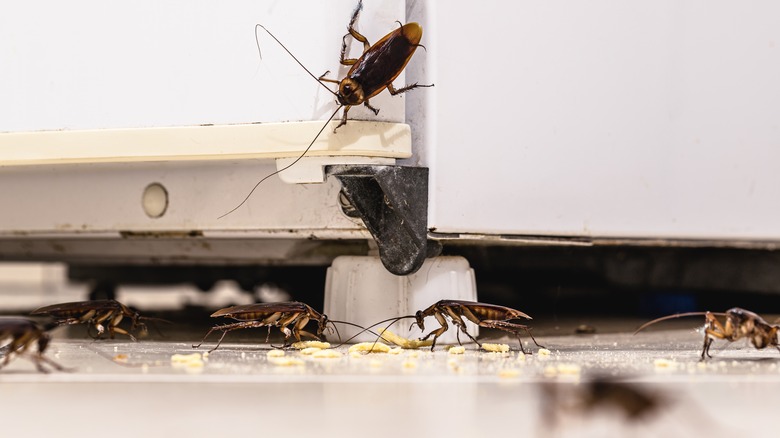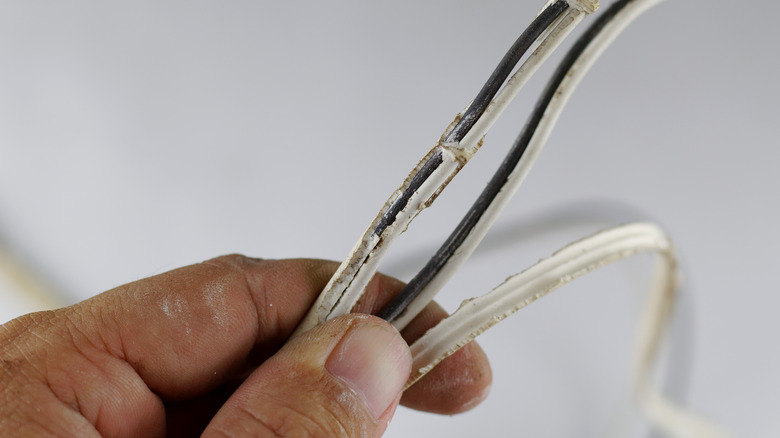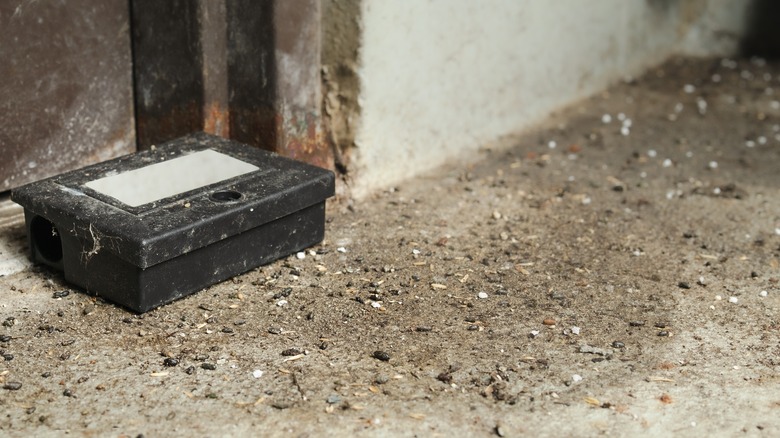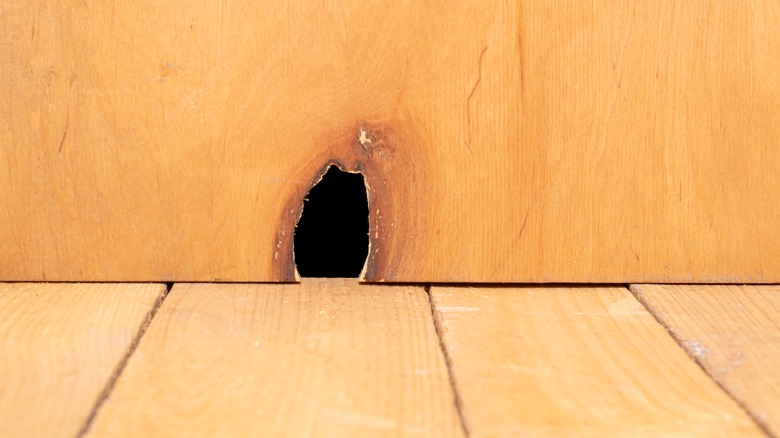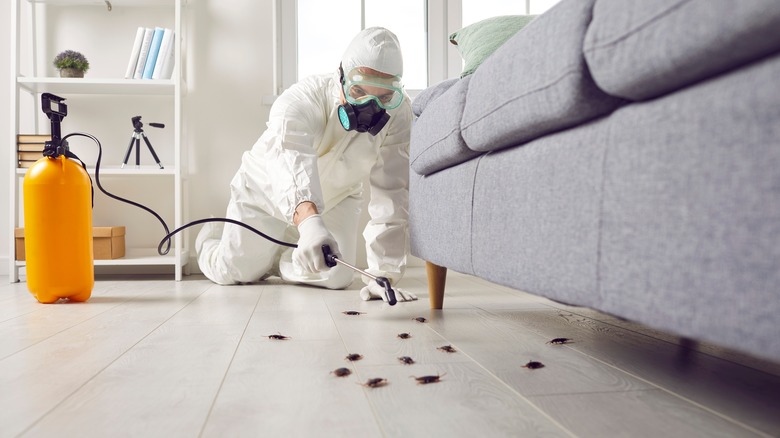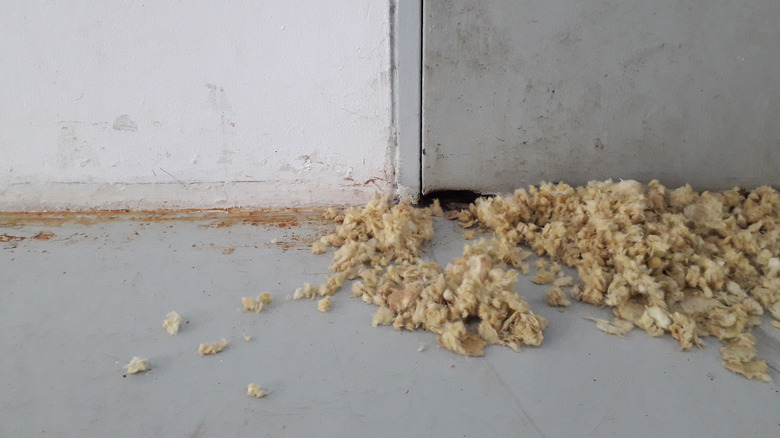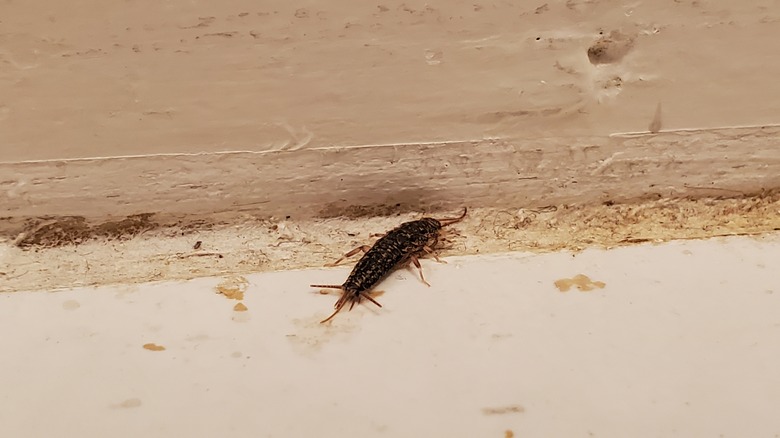Can I Do Pest Control Myself? Signs It's Time To Call The Pros
They're called pests for a reason. No one wants these insects and critters in their home, whether it is just a few ants, a lone mouse, or a full-on termite infestation. But, when you realize you have a pest problem, you may wonder whether it is really necessary to hire a professional. We know there are a lot of things to consider before hiring a pest control company. So, we reached out to the experts to learn more about when people can handle insects and critters on their own and when it is best to hire a professional. Four pest control experts spoke exclusively with House Digest about how to identify when pro help is necessary.
Jason Napolski, CEO of A-Tex Pest Management, explains that minor and contained infestations are something many people can handle on their own. "If someone notices a few ants in the kitchen or a small cluster of spiders in the basement, they can take quick action using store-bought traps, sprays, or natural remedies like vinegar or peppermint oil," he says. Napolski highlights how basic maintenance tasks, such as sealing entry points, decluttering, and keeping food stored in airtight containers, can minimize the chances of a pest infection. However, he also notes that some infestations, like bed bugs or termites, are much more complex. "In these cases, DIY methods may not be enough, and a professional pest control service should be considered to avoid further damage or health risks," he explains.
If pests persist despite your efforts, call in the pros
There are many natural DIY methods for getting rid of pests. These focus on homemade recipes or natural, chemical-free solutions, such as neem oil spray, garlic spray, soap, or chili pepper. In many cases, these pest control solutions will help you keep unwanted guests out of your home. However, sometimes you might find that the home remedy isn't effective, or it only seems to work for a few days. "This often suggests that DIY treatments are only addressing surface issues without eliminating the source," Richard Christner, the co-owner of Whitmore Pest and Wildlife Control, told House Digest in an exclusive interview.
Even if your DIY methods start out as effective, this may start to wane. "Some pests, such as bed bugs and certain types of ants, can become resistant to common store-bought chemicals," says Napolski. When this happens, he says it is time to call a professional pest control company. "We have access to safer, more effective solutions and know how to apply them without compromising health and safety," the expert explains.
Noticeable property damage is a sign that things have gotten out of your control
Unfortunately, pest infestations have the potential to cause serious damage to your home. Napolski explains that it is a good idea to call in the pros if you realize that the pests in your home are starting to cause damage. "Property damage — chewed wires, gnawed furniture, or structural damage caused by termites or other wood-destroying pests point to a larger issue," he cautions. Unfortunately, there are several pests that have the potential to cause serious damage to your home. A few of these include termites, mice, cockroaches, and carpenter ants.
"Property damage caused by rodents or other pests, particularly when they gnaw on wires or create holes, can lead to costly repairs or even fire hazards. Professionals can assess and address these issues before they worsen," says Christner. Start by calling a pest control company to eradicate your problem, and then follow up with an electrician or contractor, depending on the type of damage, to have it assessed and repaired.
Noticeable pest waste can indicate a more serious infestation
It's one thing to use a DIY remedy to get rid of a few ants crawling around your kitchen. It's another thing to assume you can handle an infestation that is large enough that you're finding pest droppings around the house. " I always advise to also watch for pest droppings, urine stains, or foul odors, especially if they're in areas you've treated, as this can indicate a more extensive infestation," says Napolski. Larger-scale infestations will be much more difficult to clear up using a DIY approach. They also have the potential to balloon even farther out of control the longer you wait. In such cases, you're probably best getting help from a professional.
Beyond the scope of the infestation that is likely accompanying the pest waste you're finding, there is another reason not to delay hiring a professional. "Rodent droppings or urine stains pose significant health risks and require specialized removal to prevent the spread of diseases like hantavirus or salmonella. Professionals can safely eliminate the infestation and prevent reoccurrence." So, let someone who knows how to best get rid of the pests and how to safely clean up their droppings take charge.
If you can hear the intruders in your house, it is probably best to get some help
When you can see the intruders you're trying to get rid of, it can be easier to eliminate the problem yourself. However, if you can't see them, but can hear them, that's a different story. "Hearing scratching or scurrying noises in your walls, ceilings, or attic is a red flag that pests have likely infiltrated spaces you can't reach with DIY methods," says Napolski. Let the professionals take care of pests nesting in your walls, chewing on wires, or causing other damage that you can't even see. Some bugs that could be lurking in your walls include wasps, bees, carpenter ants, termites, boxelder bugs, and stink bugs. If you don't know what you're dealing with because you can't even see it, it can be impossible to select the right DIY solution. So, the argument for letting an exterminator take care of it for you is that much stronger.
Insects aren't the only pests that might be hiding in your walls, while simultaneously causing damage. Critters, such as rats, mice, bats, or squirrels may have also taken up residence. "Wildlife infestations demand expert handling. Professionals can assess entry points, humanely remove wildlife, and provide exclusion services to seal off access," says Christner. He also notes that professionals will have the proper safety equipment to access attics, roofs, and other more difficult-to-reach places. Plus, Christner highlights that professionals, "also know how to identify less obvious entry points that may go unnoticed in a DIY inspection."
When you're suffering from health problems, let the pros help remedy the issue more quickly
Sometimes, a pest infestation can have serious implications for your health. Pest droppings, shed skin, dander, and other elements have the potential to aggravate asthma symptoms. Some people also have allergies to certain pests, so their presence in a home may trigger an allergic reaction and the unpleasant symptoms that go with it.
Pests can also carry, and spread, diseases. While it may not be as likely as having an allergic reaction to an unwanted guest, it is possible to contract diseases such as dysentery or gastroenteritis from a rodent or cockroach infestation. Pest waste and urine present other potential concerns. And, other pests may cause problems by physically harming you, in the form of a bite or a sting.
"Any health concerns, such as allergic reactions, bites, or respiratory issues — due to pests like bed bugs or rodents mean it's time to bring in a specialist to safeguard your home and health," Napolski explains. Your health and safety isn't worth the risk. Let a professional clear up the infestation so you can focus on restoring your health and seeking any necessary medical treatment.
Call in the experts when you're facing infestations of different types of pest
Clearing up a few spiders, ladybugs, or ants may be a task you can take care of on your own. But, what about when you're dealing with an infestation of more than one type of pest simultaneously? "Multiple pests, or pests that vary in type, signal a larger issue that requires professional training and tools to resolve fully. We have the proper pesticides and experience to determine the real problem and eliminate it at the source," President of Waltham Pest Control, Peter Rainia, shared with House Digest during an exclusive interview.
The presence of multiple types of pests may point to a secondary infestation. Sometimes, an infestation of one type of pest can encourage other kinds to invade the home. This can happen when insects or other pests are drawn to the food stockpiles created by mice or rats in a home. Or, other pests may be drawn to empty bee or wasp nests left in a home. These abandoned nests can serve as a source of food for some insects, such as flies, beets, or ants. Regardless of the cause, these are scenarios that are best left to a trusted professional. They can not only clear up the active infestation, but they will also be more knowledgeable to identify the root cause to prevent it from recurring in the future.
Evidence of nesting should be taken seriously and left to the professionals
Have you spotted any nests in your house? In an exclusive interview with House Digest, Paul Davies, a pest technician at 24/7 Pest Control, explained why spotting these is something you should take seriously. "The presence of pests nesting or breeding in your home may be a sign that your efforts aren't working and that you need pest control," he says.
While nests likely aren't right out in the open, you may be able to identify if you have a problem by giving your home a thorough inspection. If you spot piles of what looks like sawdust, it might be a sign that carpenter ants have created a nest nearby. Rodent nests are often made using scraps of paper or fabric, torn pieces of insulation, or other materials that these pests were able to get their paws on. If you notice any of these signs of nesting or spot something like a wasp nest hiding in or around your home, call the experts right away.
When you can't identify the pests, let the pros come in to find the best treatment
Certain pests are easily identifiable. Most of us know what ants, centipedes, and stink bugs look like. When you can identify the type of pest invading your home, you may feel confident starting with a DIY approach. You can simply search for the bug's name and look up effective home remedies to get rid of it.
However, sometimes you might not be able to identify the type of pest in your home. You might see if and just not know what it is, or you might only see the evidence of the infestation, but not the pest itself. "If you aren't sure what type of pest you are dealing with, call an exterminator," Davies says. They will be able to identify the insect by site, or through examining the specific droppings or other evidence it left behind. Once identified, pest control professionals will be able to determine the best remediation method. There are several types of bugs you don't want living in your home. So, trust the professionals to keep them away.
